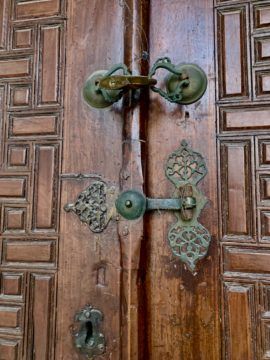by Shadab Zeest Hashmi
 First, because Moses, or the prophet Musa as we know him in the Quran, is an unusual hero— a newborn all on his own, swaddled and floating in a papyrus basket on the Nile— my brothers and I couldn’t get enough of his story as children. Second, it is also a story of siblings: his sister keeps an eye on him, walking along the river as the baby drifts in the reeds farther and farther away from home, his brother, the prophet Harun accompanies him through many crucial journeys later in life, another reason the story was relatable. Returning to the narration as a young woman, a mother, I found myself more interested in the heroines in the story: Musa’s birth-mother whose maternal instinct and faith are tested in a time of persecution, the Pharaoh’s wife Asiya who adopts the foundling as her own, confronting her megalomaniac husband’s ire and successfully raising a child of slaves and the prophesied contender to the pharaoh’s power under his own roof. As a diaspora writer, especially one wielding the colonizer’s tongue and negotiating the contradictory gifts of language, I have yet again been drawn to Musa. He is an outsider and an insider— one who carries a “knot on his tongue”— the burden of interpreting and speaking, not entirely out of choice, to radically different entities: God, the Pharaoh and his own people. Among the myriad facets of the legend, the most enduring is the innocence at the heart of his mythos, the exoteric quality of wisdom explored beautifully in mystic writings and poetry as a complementary aspect of the esoteric.
First, because Moses, or the prophet Musa as we know him in the Quran, is an unusual hero— a newborn all on his own, swaddled and floating in a papyrus basket on the Nile— my brothers and I couldn’t get enough of his story as children. Second, it is also a story of siblings: his sister keeps an eye on him, walking along the river as the baby drifts in the reeds farther and farther away from home, his brother, the prophet Harun accompanies him through many crucial journeys later in life, another reason the story was relatable. Returning to the narration as a young woman, a mother, I found myself more interested in the heroines in the story: Musa’s birth-mother whose maternal instinct and faith are tested in a time of persecution, the Pharaoh’s wife Asiya who adopts the foundling as her own, confronting her megalomaniac husband’s ire and successfully raising a child of slaves and the prophesied contender to the pharaoh’s power under his own roof. As a diaspora writer, especially one wielding the colonizer’s tongue and negotiating the contradictory gifts of language, I have yet again been drawn to Musa. He is an outsider and an insider— one who carries a “knot on his tongue”— the burden of interpreting and speaking, not entirely out of choice, to radically different entities: God, the Pharaoh and his own people. Among the myriad facets of the legend, the most enduring is the innocence at the heart of his mythos, the exoteric quality of wisdom explored beautifully in mystic writings and poetry as a complementary aspect of the esoteric.

 During my late 1970s New York City childhood, repeats of Star Trek aired every weeknight on channel 11, WPIX. The original 79 episodes ran about three times per year, which means that, allowing for the occasional miss, I’d seen each episode about 10 – 12 times before reaching high school.
During my late 1970s New York City childhood, repeats of Star Trek aired every weeknight on channel 11, WPIX. The original 79 episodes ran about three times per year, which means that, allowing for the occasional miss, I’d seen each episode about 10 – 12 times before reaching high school.